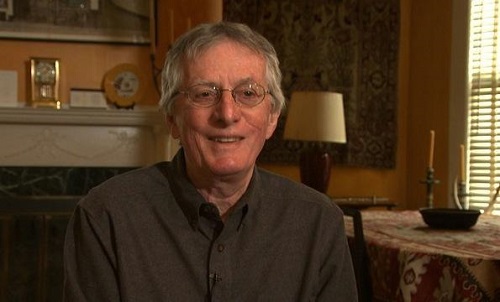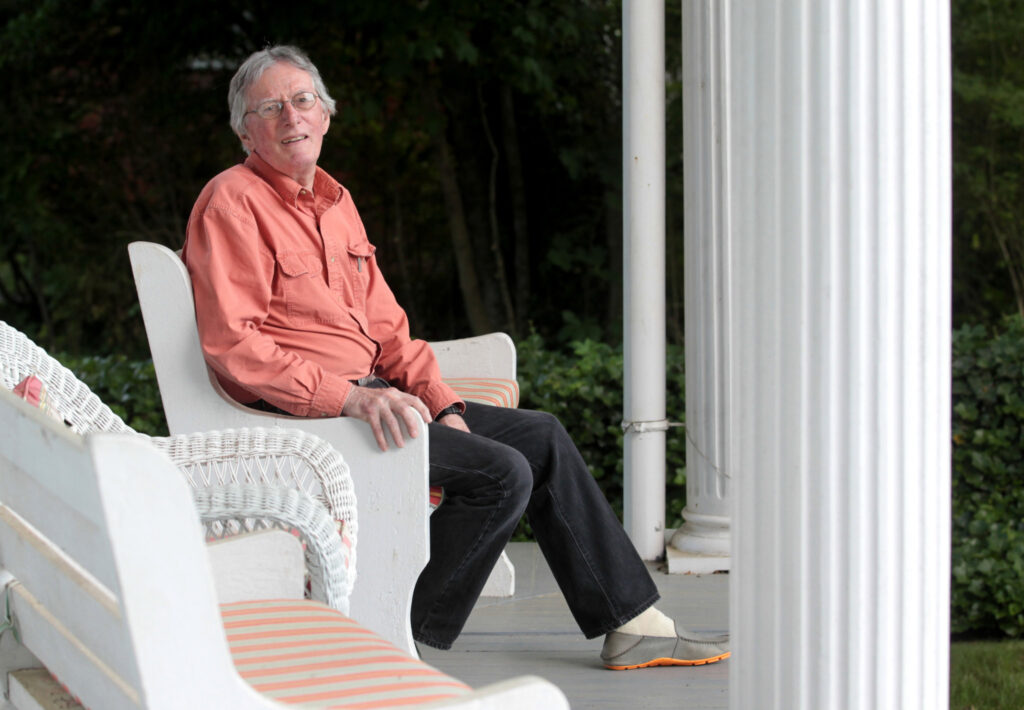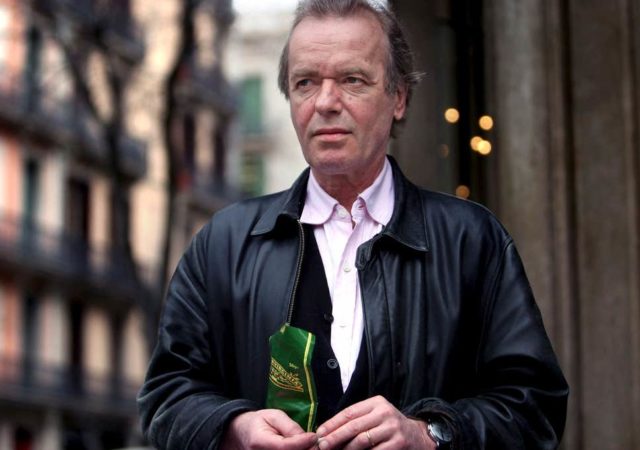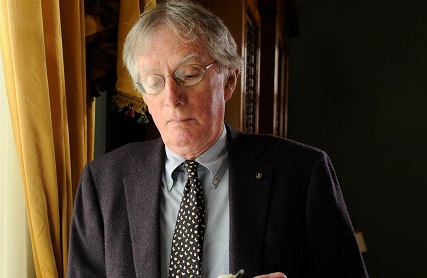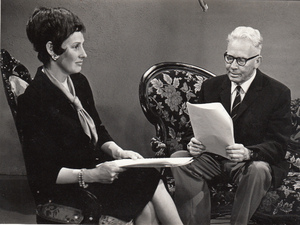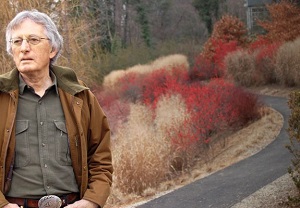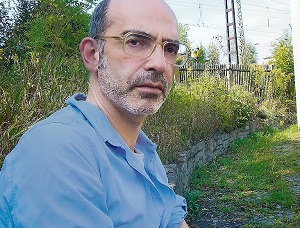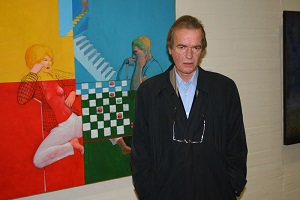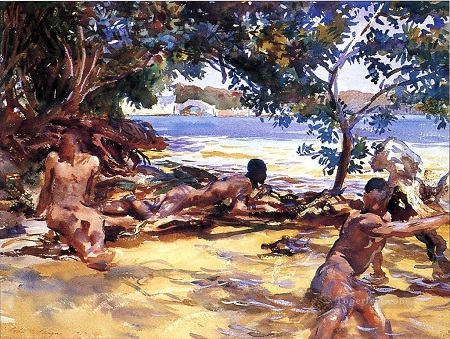De Engelse schrijver Martin Amis werd geboren op 25 augustus 1949 in Cardiff, South Wales. Zie ook alle tags voor Martin Amis op dit blog.
Uit: Het interessegebied (Vertaald door Janneke van der Meulen)
“In de officiersclub, gezeten op een paardenharen sofa, omringd door bronzen paardentuig en paardenprenten en onder het genot van ersatzkoffie (koffie voor paarden) zei ik tegen Boris Eltz, met wie ik al mijn leven lang bevriend was: ‘Heel even was ik weer jong. Het leek wel liefde: `Liefde?’ ‘Ik zei: het léék liefde. Kijk niet zo geschrokken. Het léék liefde. Een gevoel van onvermijdelijkheid. Je weet wel. Als het begin van een langdurige, heerlijke romance. Romantische liefde: ‘Déjà vu en de hele santenkraam? Ga door. Help mijn geheugen een handje: ‘Tja. Pijnlijke bewondering. Pijnlijk, ja. En gevoelens van nederigheid en onwaardigheid. Zoals jij met Esther: ‘Dat is iets heel anders,’ zei hij en priemde met een vinger naar me. ‘Dat is puur vaderlijk. Je snapt het wel als je haar ziet: `Hoe dan ook. Toen was het voorbij en ik… En ik vroeg me gewoon af hoe ze eruit zou zien zonder kleren aan: `Zie je nou wel? Ik vraag me nooit af hoe Esther eruit zou zien zonder kleren aan. Als het gebeurde, zou ik ontzet zijn. Ik zou mijn ogen afwenden: ‘En zou jij je ogen afwenden, Boris, van Hannah Doll?’ ‘Hmm. Wie had gedacht dat de Ouwe Zuiplap zo’n mooie vrouw zou hebben: ‘Ik weet het. Niet te geloven: `Die Ouwe Zuiplap. Maar even serieus. Ik weet zeker dat hij altijd al een zuiplap was. Maar hij is niet altijd oud geweest: Ik zei: ‘De meisjes zijn wat? Twaalf, dertien? Dus zij is van onze leeftijd. Of iets jonger: `En de Ouwe Zuiplap bezwangerde haar toen ze wat – achttien was?’ `Toen hij van onze leeftijd was: `Goed dan. Dat ze met hem getrouwd is, moeten we haar dus maar vergeven,’ zei Boris. ‘Achttien. Maar ze is niet bij hem weggegaan, hé. Hoe wil je dat rechtbreien?’ `Weet ik. Het is moeilijk om..: `Mmm. Ze is te lang voor mij. En nu ik erbij stilsta, ze is ook te lang voor de Ouwe Zuiplap’.
En opnieuw stelden we elkaar de vraag: waarom zou iemand zijn vrouw en kinderen hierheen halen? Hierheen? Ik zei: `Deze omgeving is meer geschikt voor mannen: ‘0, dat weet ik niet. Sommige vrouwen vinden het niet erg. Sommige vrouwen zijn net zoals de mannen. Jouw tante Gerda bijvoorbeeld. Die zou het hier uitstekend naar haar zin hebben: ‘Tante Gerda zou er geen principieel bezwaar tegen hebben; zei ik. ‘Maar dat ze het hier naar haar zin zou hebben, nou nee: ‘Zal Hannah het hier naar haar zin krijgen?’ ‘Ze maakt niet de indruk: ‘Nee, dat is waar. Maar ze is nog steeds de echtgenote van Paul Doll, vergeet dat niet: ‘Hm. Dan zal ze zich misschien wel thuis gaan voelen; zei ik. ‘Ik hoop het maar. Mijn fysieke verschijning sorteert meer effect bij vrouwen die het hier naar hun zin hebben: 1. Wij hebben het hier niet naar onze zin: ‘Nee. Maar wij hebben elkaar, goddank. Dat is niet niks: ‘Wat je zegt, jochiejij hebt mij en ik heb jou’.
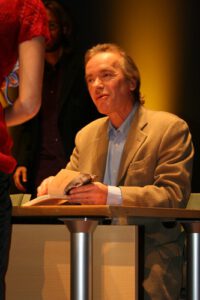
Martin Amis (25 augustus 1949 – 19 mei 2023)
De Amerikaanse dichter Charles Wright werd geboren op 25 augustus 1935 in Pickwick Dam, Tennessee. Zie ook alle tags voor Charles Wright op dit blog.
Morgen
Hij was op zoek naar de metafysica van het alledaagse:
Een beetje dauw op het gras bij zonsopgang,
Een druppel bloed in de avondbomen,
Een druppel vuur.
Als je niet schijnt, ben je duisternis.
De toekomst is genadeloos,
ieders naam staat geschreven
op het schutblad van het Boek van Sneeuw.
Vertaald door Frans Roumen
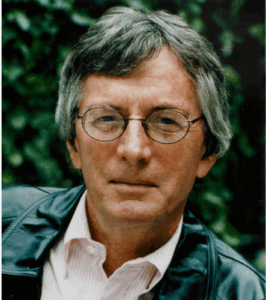
Charles Wright (Pickwick Dam, 25 augustus 1935)
Onafhankelijk van geboortedata
De Hongaars-Britse schrijver David Szalay werd geboren in 1974 in Montreal, Canada, als zoon van een Canadese moeder en een Hongaarse vader. Zijn familie verhuisde vervolgens naar Beiroet. Ze werden gedwongen Libanon te verlaten na het uitbreken van de Libanese Burgeroorlog en verhuisden vervolgens naar Londen, waar Szalay naar de Sussex House School ging. Szalay studeerde vervolgens aan de Universiteit van Oxford. Na zijn afstuderen werkte hij in Londen in de verkoop. Hij verhuisde naar Brussel en vervolgens naar Pécs in Hongarije om zijn ambitie om schrijver te worden na te jagen. Szalay heeft een aantal hoorspelen voor de BBC geschreven. Zijn boek met korte verhalen “Turbulence” uit 2018 ontstond uit een reeks programma’s van 15 minuten voor BBC Radio 4. De twaalf verhalen van “Turbulence” volgen verschillende mensen op vluchten over de hele wereld. Het onderzoekt de globalisering van familie en vriendschap in de 21e eeuw. Hij won de Betty Trask Award voor zijn debuutroman, “London and the South-East”, en de Geoffrey Faber Memorial Prize. Sindsdien heeft hij nog drie andere romans geschreven: “Innocent” (2009), “Spring” (2011) en “Flesh” (2025). Een bundel korte verhalen, “All That Man Is”, werd genomineerd voor de Man Booker Prize en won in 2016 de Gordon Burn Prize. The Spectator schreef dat “niemand de supertriestigheid van het moderne Europa zo goed weet te vangen als Szalay.” Szalay werd opgenomen in de lijst van The Telegraph van de 20 beste Britse schrijvers onder de 40 uit 2010, en in de Granta Best of Young British Novelists uit 2013. In 2025 werd Szalay’s roman “Flesh” genomineerd voor de Booker Prize van 2025.
Uit: All That Man Is
“He leaves the office two hours earlier than usual. Mid-afternoon, half-empty train to Gatwick. A window seat on the plane. Weak tea, and a square of chocolate with a picture of Alpine pasture on the wrapper. And then it hits him. Floating over the world, the hard earth fathoms down through shrouds of mist and vapour, the thought hits him like a missile. Wham. This is it. This is all there is. There is nothing else.
A silent explosion.
He is still staring out the window.
This is all there is.
It’s not a joke. Life is not a joke.
She is waiting for him at arrivals, holding up an iPad with his name on it, though she knows what he looks like from his picture on the website and approaches him, smiling, as he stands there facing the wall of drivers with their flimsy signs.
‘James?’ she says.
The difference in height is significant.
‘You must be Paulette.’
She has a scar – is it? – on her lower lip, a pale little lump, somewhat off centre. There is a handshake. ‘Welcome to Geneva,’ she says.
And then, the motorway – on stilts, through tunnels. France. The low sun on one side of his face. Fresh evening light.
She says, ‘So, tomorrow.’
‘Yes.’ He is watching something outside, something on the move in the green-gold light. Everywhere he looks, he sees money.
‘I’ve arranged for us to meet them at the site,’ she says.
‘Fine. Thank you.’ She is efficient, he knows that. She answers his emails promptly, with everything he needs.
He had started speaking to her in French, as he followed her out of the arrivals lounge. She had answered in English, and for a minute there was a silly situation with each of them speaking the other’s language.”

David Szalay (Montreal, 1974)
Zie voor nog meer schrijvers van de 25e augustus ook mijn blog van 25 augustus 2020 en eveneens mijn blog van 25 augustus 2018 deel 1 en eveneens deel 2.


